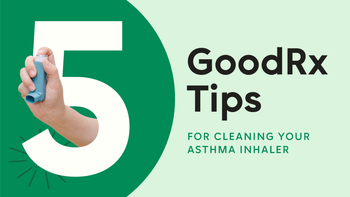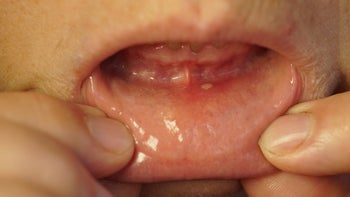
9 Advair Side Effects You Should Know About
Key takeaways:
The most common Advair (fluticasone / salmeterol) side effects include thrush, sore throat, and nausea. Rinsing your mouth after each dose of Advair can help prevent these problems.
Using Advair for a long period of time may weaken your bones. The risk isn’t as great as with oral steroids, but be sure your prescriber knows if you have a history of osteoporosis or are at risk for developing weak bones.
Serious Advair side effects are rare, but they can include severe infections, an irregular heartbeat, and eye problems. Be sure to tell your healthcare team about any side effects you experience while using Advair.
Access savings on related medications
Table of contents

Advair (fluticasone / salmeterol) is a popular combination inhaler used to treat asthma and chronic obstructive pulmonary disease (COPD). It contains two medications: fluticasone (Flovent), a steroid, and salmeterol (Serevent), a beta-agonist. Both are long-acting medications inhaled every day to help manage asthma or COPD symptoms.
Like all medications, Advair can cause side effects. And since it contains two different medications, both ingredients have side effects to be aware of.
Advair side effects at a glance
Advair is available in two forms: Advair Diskus and Advair HFA. But the possible side effects are the same, no matter which form of Advair you’re prescribed. Below is a list of common and rare Advair side effects reported in clinical studies.
Common Advair side effects include:
Thrush (a fungal infection of the mouth and throat)
Upper respiratory tract infections
Sore throat
Hoarse voice
Cough
Headache
Dizziness
Nausea and vomiting
Diarrhea
Tremors
Nervousness
Short-term increase in heart rate
Rare but serious Advair side effects include:
Increased risk of severe infections
Increased risk of low bone density
Bronchospasm (trouble breathing or swallowing)
Irregular heartbeat
Delayed growth (in children)
Increased risk of glaucoma and cataracts
Cushing’s syndrome
Allergic reactions
Let’s take a closer look at nine potential Advair side effects and how to manage them. Keep in mind, this isn’t a complete list of all possible side effects. It’s best to talk to your healthcare team if you experience any side effects while taking Advair, even if they aren’t listed here.
1. Thrush
Thrush is a mouth and throat infection that happens when yeast overgrows. It can happen while using Advair because it contains a steroid (fluticasone). Steroids can weaken your body’s ability to fight infections. For inhaled medications, infections are more common in areas the medication touches, mainly the mouth and throat.
You can lower your risk of thrush while using Advair by gargling with water and spitting it out after each use. But if symptoms appear, such as yellow or white patches in your mouth and throat or pain when swallowing, let your prescriber know. They can prescribe medication to treat it. They’ll also let you know if you should stop using Advair while your thrush heals.
Are there other maintenance inhalers? Learn about other popular long-acting maintenance inhalers and how they work.
Should you clean your inhaler? Yes. Cleaning inhalers regularly helps them work effectively. Here’s how to clean your inhaler and how often it’s recommended.
Advair dosages: Learn the recommended dosages for both Advair HFA and Advair Diskus, as well as how to save on their cost.
2. Higher risk of other infections
As mentioned, steroids such as fluticasone can weaken your immune system. This can make you more prone to infections. Other than thrush, upper respiratory tract infections (such as the common cold) were the most common infections experienced in clinical studies. But more serious lung infections, such as pneumonia, are also possible.
The most common symptoms of infection include cough, fever, and congestion. Symptoms can overlap with COPD or asthma, so it may be hard to know what’s causing them. If you’re experiencing any of these symptoms, it’s best to contact your prescriber. They’ll be able to determine the cause and best treatment option.
Good to know: Cleaning your inhaler may help reduce the risk of infections. So be sure to follow the manufacturer’s recommendations for keeping your inhaler clean.
3. Sore throat, cough, or hoarse voice
Some people experience a sore throat, cough, or hoarse voice with Advair. In studies, sore throat was more common than a cough or hoarseness.
Most people are able to continue taking Advair, even if they experience these side effects. Rinsing your mouth after each use may help prevent them. Staying hydrated can help, too.
You can also try an over-the-counter (OTC) treatment, such as throat lozenges or spray. But if these side effects become bothersome, or if you also have a fever, let your prescriber know. There may be an infection or other issue at hand.
4. Headache
Headache is another possible Advair side effect. In studies, it was one of the most common side effects people experienced.
Getting enough sleep, avoiding too much caffeine, and staying hydrated can help with headaches. You can also try an OTC pain reliever such as acetaminophen (Tylenol) or ibuprofen (Advil, Motrin). But check with your healthcare team first to be sure they’re safe options for you.
If your headache doesn’t go away or becomes severe, seek medical care. There may be a more serious cause that requires further treatment.
5. Nausea or vomiting
Nausea or vomiting can also happen while using an Advair inhaler. This is because the medication can irritate your stomach if you swallow it. If you forget to rinse your mouth after using your Advair inhaler, more medication is left behind that you may swallow. So rinsing after each use can help prevent nausea as well as mouth infections.
If your nausea persists, ginger is a natural remedy that may help. But if it becomes bothersome, talk to your healthcare team. They may recommend a nausea medication or change your Advair dosage to help manage it.
6. Fast or irregular heartbeat
A short-term increase in heart rate is a common Advair side effect. That’s because salmeterol, one of the active ingredients in Advair, can cause your heart to beat faster. This normally only lasts for a few minutes. But in rare cases, it may cause a fast or irregular heartbeat that doesn’t go away.
If you notice your heart beating faster more than 10 to 15 minutes after inhaling Advair, or if you have chest pain or trouble breathing, seek medical care right away.
7. Low bone density
Low bone density means your bones are weaker and may break easier than they should. Oral steroid medications can lower bone density when taken at high doses or for a long period of time. But it’s unclear whether inhaled steroids can also cause this side effect.
Your healthcare team will determine if Advair is safe for you to take based on your medical history. It’s also important to make sure your prescriber has your complete medication list, in case any of your other medications may also weaken your bones.
Your prescriber may check your bone density over time to make sure it’s at a healthy level. You can support healthy bone density at home by eating enough protein and calcium and practicing weight-bearing exercises.
8. Difficulty breathing or swallowing
Normally, Advair helps prevent breathing difficulty caused by asthma or COPD. But in rare cases, it can lead to bronchospasm — a sudden tightening of your airways. This can lead to trouble breathing or swallowing normally.
Bronchospasm is a rare Advair side effect, but if it happens, it’s best to seek emergency care. In most cases, it can be treated with a rescue inhaler, such as albuterol (Ventolin HFA). But you’ll likely have to stop using Advair if this side effect occurs.
9. Eye problems
Eye problems are another less-common Advair side effect. These problems include glaucoma, which happens when pressure in your eye increases. Some people also developed cataracts or experienced eye infections or dry eye in clinical studies.
Dry eyes may be red or watery. And if you have cataracts, you might experience blurry vision or have trouble seeing at night. But most people with glaucoma don’t have any symptoms. So it’s a good idea to get regular eye exams while you’re using Advair. This can help you detect and treat eye problems. If you develop vision changes at any time, let your prescriber know right away.
Frequently asked questions
Yes. Fluticasone, one of the active ingredients in Advair, is a steroid medication. You may have heard about potential long-term side effects of taking steroids. These can include weight gain, mental health changes, and acne. But inhaled steroids, such as Advair, seem to have a lower risk of these issues. That’s because they aren’t absorbed as much into your bloodstream.
Oral steroids can cause insomnia (trouble sleeping) for some people. This is because they mimic the effects of cortisol in your body, which can make you feel restless. Advair and other inhaled steroids are less likely to affect your sleep, but it’s still possible. Talk to your prescriber if you’re having trouble sleeping while using Advair. They can make dosage changes or suggest a treatment option, such as melatonin.
Advair may increase your risk of cavities and other dental problems, although these aren’t common side effects. The risk for teeth-related problems is higher if you don’t rinse your mouth after each dose of Advair. Getting regular dental care can help prevent problems or detect them soon enough to address them. If you experience tooth pain or trouble chewing normally while using Advair, let your prescriber know and seek dental care right away.
The bottom line
Advair (fluticasone / salmeterol) is a combination inhaler that treats asthma and chronic obstructive pulmonary disease (COPD). Common Advair side effects include thrush, sore throat, and nausea. Rinsing your mouth after each use can help prevent these side effects.
Rare, but serious Advair side effects include pneumonia, irregular heartbeat, and eye problems. In rare cases, bronchospasm (sudden trouble breathing or swallowing) can also happen while using Advair. Long-term use of Advair may lead to lower bone density, but the risk of this and other serious side effects of oral steroids seems to be much lower when they’re inhaled.
Why trust our experts?



References
A-S Medication Solutions. (2024). Advair Diskus- fluticasone propionate and salmeterol powder [package insert].
Bennett, J. A., et al. (1997). Time course and relative dose potency of systemic effects from salmeterol and salbutamol in healthy subjects. Thorax.
GlaxoSmithKline LLC. (2024). Advair HFA- fluticasone propionate and salmeterol xinafoate aerosol, metered [package insert].
Miravitlles, M., et al. (2021). Systematic review on long-term adverse effects of inhaled corticosteroids in the treatment of COPD. European Respiratory Review.
Pacheco-Quito, E.-M., et al. (2023). Drugs prescribed for asthma and their adverse effects on dental health. Dentistry Journal.
Pandya, D., et al. (2014). Systemic effects of inhaled corticosteroids: An overview. The Open Respiratory Medicine Journal.
Yokoyama, H., et al. (2006). Influence of mouth washing procedures on the removal of drug residues following inhalation of corticosteroids. Biological and Pharmaceutical Bulletin.
Was this page helpful?
Related Articles
Browse medications
View AllResearch prescriptions and over-the-counter medications from A to Z, compare drug prices, and start saving.





















